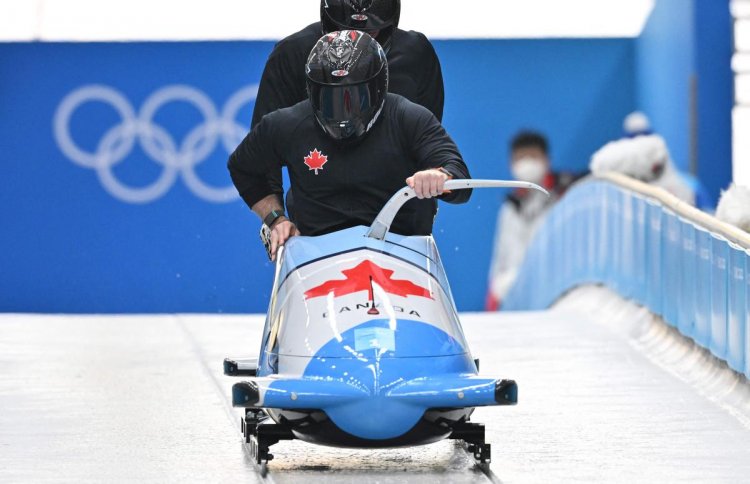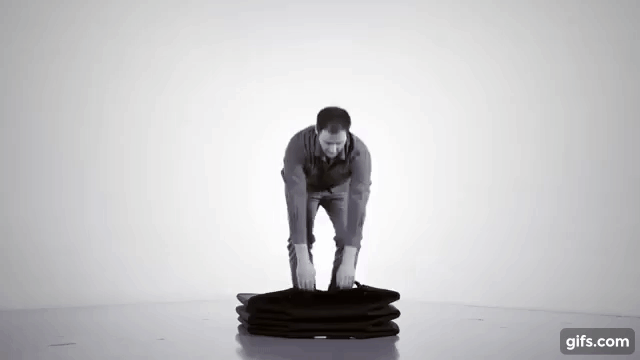Dave Feschuk: Justin Kripps’ recipe to beating bobsled great Francesco Friedric in Beijing? Olympic belief
BEIJING In a lot of ways, you can make the case everybody else in the Olympic men’s bobsled field has come an awfully long way to essentially compete for silver and bronze.Such is the level of dominance Germany’s Francesco Friedrich has achieved over the bulk of the past decade that it’s widely assumed he’d need to trip on a proverbial banana peel to not end these Olympics standing atop a couple of podiums. Not only is Friedrich, the peerless German driver, the defending gold medallist in both the two-man and four-man events, which begin here this week. He’s won seven straight world championships in the two-man event and four straight in four-man. And the consensus on the circuit is that he’s only been getting more dominant in recent years. To wit, over the past two World Cup seasons, Friedrich has lost a combined two races.So give Canada’s Justin Kripps credit: As much as it would be easy to arrive at the palatial Yanqing National Sliding Centre and defer to the sport’s reigning king, Kripps has done nothing of the sort.“The Olympics is the great equalizer, I like to say,” Kripps said.Kripps, as the No. 2 pilot on the planet, should know. One of the rare interruptions in Friedrich’s sole possession of world dominance, after all, came four years ago in Pyeongchang, when Kripps and brakeman Alex Kopacz pulled off a memorably rare sporting feat: A tie for gold in the Olympic two-man. That triumphant moment sits atop of the list of reasons why Kripps believes an upset is possible here. Which is not to say he’s denying Friedrich’s talent. The two pilots have formed what Kripps describes as a “strong bond” since tying for gold in Pyeongchang.“He wins everything, right?” Kripps was saying this week. “Obviously people would consider him the one to beat. I think they also considered him the one to beat going into 2018, and he’s even more dominant now.”He’s beyond dominant on the World Cup circuit. But the World Cup circuit is a decidedly advantageous stomping grounds for Friedrich. Four of the eight races are run on German tracks. The whole of the tour takes place in Europe.“They have thousands of runs on those tracks and they know exactly what equipment to use,” Kripps said. “So for us to have come out of the World Cup in second, we feel good about that. But this is the Olympic Games. It’s four runs. Anything can happen. It’s a track where people have less experience so I think it’s going to come down to race day. There’s a number of people who if they put down four consistent runs they can win the race, and (Friedrich is) definitely one of them.”It’s not as though Kripps, who will also pilot a four-man sled here, hasn’t been faced with his own challenges in the lead-up to these Games. There was turnover in his crew in the wake of Pyeongchang, with his longtime running mates, including Kopacz, retiring. Now he’s joined in the two-man by brakeman Cam Stones, a member of the Nick Poloniato-piloted four-man sled that finished 12th in Pyeongchang. The four-man contingent is rounded out by three-time Olympian Ben Coakwell and Games rookie Ryan Sommer. All four have been together for the bulk of the quadrennial, COVID absences excepted. So there’s belief in the Canadian team that their steady improvement over the four-year journey is primed to peak here.“All they need to do is race to their potential and they’ll win medals,” said Lyndon Rush, the former Olympian who’s now Canada’s driver coach. “If Kripps drives the way he’s capable, if they push the way they’re capable, I think we should be right in the hunt.”Kripps has another reason for his Olympic belief: The overall strength of Canada’s contingent here. Longtime pilot Chris Spring is in his fourth Olympics for Canada. Canada’s No. 3 driver, Taylor Austin, is an Olympic rookie. But the well-established team culture has it that Canada’s drivers plan to share their insights on the best way to attack the Olympic track.“You can figure out the track much, much faster working together than if you keep your cards close to your chest,” said Kripps.Such collaboration is hardly a given. Spring and Austin, after all, are Kripps’s teammates, sure, but they’re also his direct competitors, the same as any other driver in the field. But perhaps it’s as much a testament to German dominance as it is to Canadian co-operation that the bobsledders wearing the Maple Leaf are committed to communal information.“It is a delicate line to walk and there can be tensions that arise from that,” Kripps said. “But going into Pyeongchang, I remember a specific moment between the three men’s pilots, myself, Chris and Nick, we decided we had to work together, because for any one of us to get onto the podium we needed every advantage we could possibly get. We consciously made that choice ... I ended up being the one who won. But I know they were genuinely happy, because they both played a huge role in it.”In other words: The German juggernaut is a daunting foe. They’ve carved out an equipment advanta


BEIJING In a lot of ways, you can make the case everybody else in the Olympic men’s bobsled field has come an awfully long way to essentially compete for silver and bronze.
Such is the level of dominance Germany’s Francesco Friedrich has achieved over the bulk of the past decade that it’s widely assumed he’d need to trip on a proverbial banana peel to not end these Olympics standing atop a couple of podiums. Not only is Friedrich, the peerless German driver, the defending gold medallist in both the two-man and four-man events, which begin here this week. He’s won seven straight world championships in the two-man event and four straight in four-man. And the consensus on the circuit is that he’s only been getting more dominant in recent years. To wit, over the past two World Cup seasons, Friedrich has lost a combined two races.
So give Canada’s Justin Kripps credit: As much as it would be easy to arrive at the palatial Yanqing National Sliding Centre and defer to the sport’s reigning king, Kripps has done nothing of the sort.
“The Olympics is the great equalizer, I like to say,” Kripps said.
Kripps, as the No. 2 pilot on the planet, should know. One of the rare interruptions in Friedrich’s sole possession of world dominance, after all, came four years ago in Pyeongchang, when Kripps and brakeman Alex Kopacz pulled off a memorably rare sporting feat: A tie for gold in the Olympic two-man. That triumphant moment sits atop of the list of reasons why Kripps believes an upset is possible here. Which is not to say he’s denying Friedrich’s talent. The two pilots have formed what Kripps describes as a “strong bond” since tying for gold in Pyeongchang.
“He wins everything, right?” Kripps was saying this week. “Obviously people would consider him the one to beat. I think they also considered him the one to beat going into 2018, and he’s even more dominant now.”
He’s beyond dominant on the World Cup circuit. But the World Cup circuit is a decidedly advantageous stomping grounds for Friedrich. Four of the eight races are run on German tracks. The whole of the tour takes place in Europe.
“They have thousands of runs on those tracks and they know exactly what equipment to use,” Kripps said. “So for us to have come out of the World Cup in second, we feel good about that. But this is the Olympic Games. It’s four runs. Anything can happen. It’s a track where people have less experience so I think it’s going to come down to race day. There’s a number of people who if they put down four consistent runs they can win the race, and (Friedrich is) definitely one of them.”
It’s not as though Kripps, who will also pilot a four-man sled here, hasn’t been faced with his own challenges in the lead-up to these Games. There was turnover in his crew in the wake of Pyeongchang, with his longtime running mates, including Kopacz, retiring. Now he’s joined in the two-man by brakeman Cam Stones, a member of the Nick Poloniato-piloted four-man sled that finished 12th in Pyeongchang. The four-man contingent is rounded out by three-time Olympian Ben Coakwell and Games rookie Ryan Sommer. All four have been together for the bulk of the quadrennial, COVID absences excepted. So there’s belief in the Canadian team that their steady improvement over the four-year journey is primed to peak here.
“All they need to do is race to their potential and they’ll win medals,” said Lyndon Rush, the former Olympian who’s now Canada’s driver coach. “If Kripps drives the way he’s capable, if they push the way they’re capable, I think we should be right in the hunt.”
Kripps has another reason for his Olympic belief: The overall strength of Canada’s contingent here. Longtime pilot Chris Spring is in his fourth Olympics for Canada. Canada’s No. 3 driver, Taylor Austin, is an Olympic rookie. But the well-established team culture has it that Canada’s drivers plan to share their insights on the best way to attack the Olympic track.
“You can figure out the track much, much faster working together than if you keep your cards close to your chest,” said Kripps.
Such collaboration is hardly a given. Spring and Austin, after all, are Kripps’s teammates, sure, but they’re also his direct competitors, the same as any other driver in the field. But perhaps it’s as much a testament to German dominance as it is to Canadian co-operation that the bobsledders wearing the Maple Leaf are committed to communal information.
“It is a delicate line to walk and there can be tensions that arise from that,” Kripps said. “But going into Pyeongchang, I remember a specific moment between the three men’s pilots, myself, Chris and Nick, we decided we had to work together, because for any one of us to get onto the podium we needed every advantage we could possibly get. We consciously made that choice ... I ended up being the one who won. But I know they were genuinely happy, because they both played a huge role in it.”
In other words: The German juggernaut is a daunting foe. They’ve carved out an equipment advantage with a proprietary research and development company that creates world-beating sleds and runners unavailable to the rest of the field. And then Friedrich, on top of sporting the best machinery, is one of the sport’s top athletes, leading the field in starts while consistently steering his craft into the winners’ circle.
“They’re just really, really at the top of their game as far as their equipment. And they’re also on top of their game in other aspects. They have great athletes. They have great drivers,” Kripps said of the Germans. “But you still can beat them. I know what it’s like to have an equipment advantage, and what it does for you – it doesn’t give you a free pass to win the race or win medals. The Olympics is just different.”
Dave Feschuk is a Toronto-based sports columnist for the Star. Follow him on Twitter: @dfeschuk




















